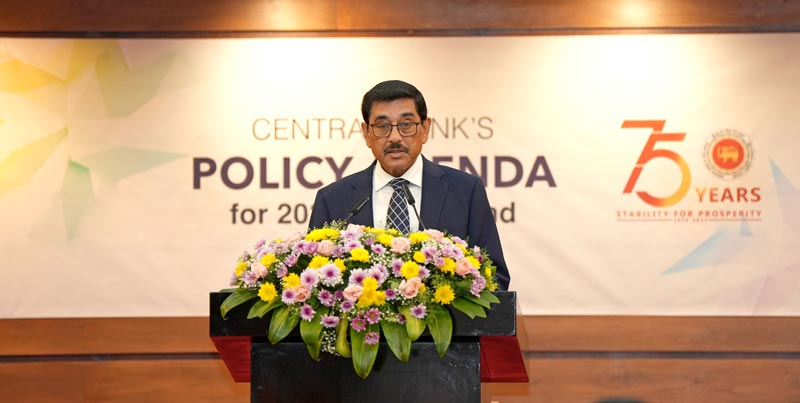Friday Feb 20, 2026
Friday Feb 20, 2026
Thursday, 9 January 2025 03:16 - - {{hitsCtrl.values.hits}}

The Central Bank of Sri Lanka (CBSL) yesterday declared that Sri Lanka stands stronger with restored macroeconomic and financial sector stability following several difficult years, and future success is conditional on the country’s commitments to pursue necessary economic reforms.
The CBSL said the economy in 2024 is estimated to have grown by 5%, the highest since 2017, reflecting improved macroeconomic fundamentals.
Speaking at the launch of the CBSL’s Policy Agenda for 2025 and Beyond, Governor Dr. Nandalal Weerasinghe emphasised that Sri Lanka has made a significant recovery after enduring its worst economic crisis in history. Macroeconomic stability, which was restored through decisive policy action and collective resolve, has laid the foundation for a stronger, more resilient economy. Leveraging on the stability achieved, the country is making notable progress by continuing with the economic reform agenda, strengthening its economic buffers, institutions and governance, and building overall resilience for potential headwinds.
According to Dr. Weerasinghe, significant progress was made on the fronts of debt restructuring as well as the Extended Fund Facility (EFF) arrangement with the International Monetary Fund (IMF). Faster-than-expected recovery in domestic economic activity was supported by renewed business and consumer confidence.
He said general price levels have adjusted down following a period of high inflation, enabling the continuation of the eased monetary policy stance. External buffers have been built, supported by improved foreign exchange inflows amidst the flexible exchange rate regime. A notable improvement in the fiscal sector performance was witnessed along with efforts to enhance support extended to the poor and vulnerable. Financial system stability was reinforced through the strengthening of the regulatory framework and improved risk management and monitoring.
“These achievements are outcomes of the continued commitment and perseverance and the sacrifices made by all stakeholders of the economy, including the general public, in pursuing the economic reform agenda. More importantly, these measures have helped restore investor confidence and set the platform for the long-term transformation of the economy,” the CBSL Chief said.
While broad-based stability has been achieved, according to the Governor the focus, going forward, would be on fostering sustained growth, which requires driving innovation, enhancing productivity, maintaining a strong commitment to implementing structural reforms, and encouraging greater stakeholder collaboration without compromising hard-earned stability.
He stressed that notwithstanding Sri Lanka’s faster-than-expected recovery compared to other countries that faced similar situations, sustaining stability in the medium to long run remains “conditional on the country’s commitments to pursue necessary economic reforms.”
“Achieving a transformative acceleration in growth trajectory is essential to catch up and enhance the growth potential. This would also help enhance the debt-carrying capacity of the country,” the CBSL Chief said.
According to him, building buffers to withstand shocks and accelerating growth without compromising on economic and financial system stability is the essential next step for the country’s progress.
“In this regard, the CBSL will continue its role in maintaining domestic price stability and safeguarding the financial system stability, while supporting the economy to reach its potential,” Dr. Weerasinghe assured.
The Governor’s statement recapped the economic and financial sector performance and policies supporting price stability with salient features of implementation of monetary policy and maintaining external sector stability. He also detailed policies pursued in 2024 to strengthen financial system stability.
The statement also recapped specific policies concerning banking, non-banking financial institutions, macro-prudential policies, initiatives under sustainable finance, payment and settlement systems, and improving financial consumer relations and other policies and functions of the CBSL.
Key highlights and future plans for financial inclusion, public debt management, foreign exchange management, financial intelligence, EPF, and strengthening internal efficiency of the CBSL were also highlighted.
Importance of effective coordination between CBSL and Government
In his presentation, the CBSL Governor also said the effective coordination between the CBSL and the Government on fiscal, monetary, and financial stability policies is extremely important for consistent economic policy formulation and in achieving the CBSL’s objectives.
In pursuing the price stability objective, since inflation is frequently influenced by supply-side factors and impacts of fiscal policy measures, proper policy coordination is essential. This is equally important in pursuing the financial system stability objective. Government policies could affect the financial sector, while CBSL policies on the financial sector could have a bearing on Government operations.
He said that the Coordination Council established under the Central Bank Act provides for the coordination of fiscal, monetary, and financial stability policies between the Government and the CBSL. The Coordination Council meets quarterly, where macroeconomic and financial conditions and outlook; and potential gaps relating to fiscal, monetary, and financial stability coordination are discussed in detail, alongside deliberations on strategies and the way forward to address any challenges.
Meanwhile, through the Financial Sector Crisis Management Committee (FCMC) and the Financial System Oversight Committee (FSOC), the CBSL coordinates with the Government and other stakeholders, including regulatory bodies, focusing on crisis preparedness and reducing the risk of coordination failures, to maintain a healthy financial system.
In addition, cordial meetings with the President and Finance Minister and Deputy Ministers are conducted, as and when needed, on various matters relating to central banking and related economic and financial issues.
Key officials of the CBSL present before several committees of the Parliament as provided in the Central Bank Act as well as on request, particularly to describe actions of the CBSL and their impacts, and subjects related to the CBSL.
“Going forward, the continuation of such fiscal-monetary-financial system policy coordination will remain equally important, as the economy is expected to enter a comparatively normal period after several years of crises and uncertainty. Healthy policy coordination is expected to lead to a stable macroeconomic environment, which is an absolute necessity for the stakeholders, including the private sector, to promote productivity and efficiency in the economy, facilitating sustainable and inclusive growth,” the CBSL Governor emphasised.

FT Quick Take
Key highlights of CBSL’s Policy Agenda 2025 and Beyond